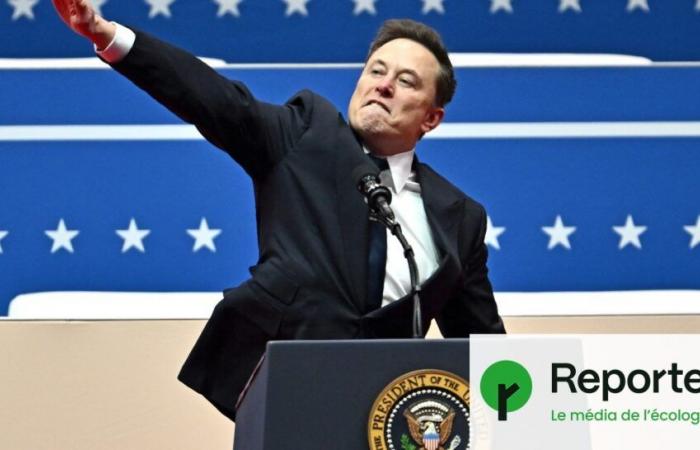Irénée Régnauld, associate researcher at the University of Technology of Compiègne, is co-author ofA history of the conquest of space. From Nazi rockets to New Space astrocapitalists (La Fabrique, 2024). He comes back for Reporterre on the ambition to conquer the planet Mars mentioned by Donald Trump on January 20, during his inauguration speech as 47th president of the United States, and on what it tells us about the evolution of capitalism and US imperialism.
Reporterre — Elon Musk distinguished himself with a double Nazi salute during the inauguration ceremony, and openly supports the far right. In your work, you underlined the fundamental contribution of the Nazis to the space epic in the 1940s. Is there a continuity or common ground which explains these bridges between the extreme right and astrocapitalism? ?
Irénée Régnauld — Space activities are anchored in this particular moment of the Second World War when, under the Third Reich, they were industrialized. With many figures, the best known of which is Wernher von Braun, who in the post-war period played a central role at NASA in the Apollo program after having been active in Nazism in Germany during the war. A dimension often hidden, and this pioneering figure is often admired in the community. We can read in Musk's 2016 biography that SpaceX even named a room in tribute to von Braun.
This does not make Elon Musk a fascist, nor astronautic activities simple echoes of Nazism… Elon Musk's compatibility with these political schemes can, however, be found elsewhere: his authoritarian management of Tesla where he denies union rights , the torture of animals that he practices with Neuralink to test his brain implants, his threats about the possibility of a coup d'état in Bolivia to secure the supply of lithium… not to mention the expropriations of native Americans in Boca Chica: colonial and imperialist logics are inseparable from Musk.
We can also speak today of astrocapitalism and even astrofascism when we see the sacrificial turn that SpaceX is taking. NASA has developed a culture of safety, especially after the fatal accidents of its space shuttles. But Musk has been preparing people for years for the idea that there will be deaths during the conquest of Mars. This notion of self-sacrifice, of ultimate sacrifice in the service of a vision, is one of the codes of fascism.
In his inauguration speech, Donald Trump mentioned the goal of sending the United States “ plant the star-spangled banner on the red planet “. Mars colonization is also the obsession of Elon Musk, who joined the Trump administration, how do you analyze this statement ?
This is fully in line with the tone of a speech which aims to awaken the symbolic power of the United States in the Maga era [« Make America Great Again », le slogan des trumpistes]in an imperialist dynamic. The fact that he talks about planting the American flag on Mars is symptomatic: at the time of the Apollo program, during the conquest of the Moon in the 1960s, Kennedy was more nuanced. He even considered the possibility of starting a joint project with theUSSRwhich was unsuccessful.
If Apollo obviously had a nationalist dimension, the possibility of planting the flag ofHIM on the Moon was still mentioned, even if it was ultimately the flag of the United States that was planted. The philosophy of this sequence was, in any case, different, even if the bet was already crazy.
During his first term, Donald Trump made the return of astronauts to the Moon a major objective. Today he is looking towards Mars. Is there any form of coherence in these major space announcements? ?
The two projects have nothing to do with each other, even if in the Artemis program [qui vise à poser à nouveau des astronautes sur la Lune en 2026]there is this idea that returning to the Moon can serve as a springboard for subsequent Martian exploration. But the lunar project has a dated, credible horizon, even if, as is often the case in astronautics, the timetable has slipped.
For March, we have no date, and, in any case, it will not happen during Trump's mandate. Note also that it was he who relaunched the lunar objective after the Obama era, when there was still talk of going into Martian orbit in the middle of the 2030s.
Read also: From Nazis to astrocapitalists: the anti-ecological history of the conquest of space
Going to Mars requires colossal funds amounting to hundreds of billions of dollars. The return to the Moon, much less complex to achieve, has already cost around a hundred billion dollars over the past fifteen years, and still faces immense challenges.
The Starship launcher developed by SpaceX, Elon Musk's company, to go to the Moon has fallen behind schedule, its lunar version (HLS) is not yet tested. The project is very expensive for the United States but Elon Musk needs it economically. Even if it was probably him who put the Martian idea in Donald Trump's head, it would surprise me if it was to the detriment of the lunar project in the short term: Artemis is still necessary, if only to validate SpaceX technologies.
Even if it is not very credible, what does the Mars objective reveal about the world vision conveyed today by the United States? ?
We are still in the overused and falsely historical myth of « manifest destiny »according to which the USA would have as their divine mission the expansion of civilization towards the West.
Trump also mentions « new horizons »in line with so-called borderist ideas, theorized by the American historian Frederick Jackson Turner in XIXᵉ century, according to which the United States needs a « new frontier » so as not to decline. It is the story of the conquest of the West transposed to the conquest of space. Note that this story is not the prerogative of Republicans in the United States.
This term of “ manifest destiny » that you mention refers to Calvinist ideology and the divine mission that would have been the conquest of the West. It's necessary “ pursuing our “manifest destiny” to the stars » declared Donald Trump. What importance does this religious dimension have in American expansionism? ?
There is in the background this idea of expanding civilization, with economic but also religious motivations. We must take supposedly virgin lands and populate them according to the biblical message. Elon Musk, who himself has twelve children, is fully part of this imagination.
Generally speaking, the history of space is full of religious references. Rocket access protocols are very ritualized, in the United States as in Europe or Russia, where Orthodox priests bless each of the missions before they take off into the skies. The very figure of the astronaut is, for certain space historians, a quasi-religious figure.
Donald Trump also repeats his desire to annex Greenland. The contexts and issues are certainly of a different nature, but can we see a certain continuity in this desire for territorial expansion, from Greenland to Martian fantasies? ?
This is specific to imperialism and American capitalism, which we call, in its spatial dimension, astrocapitalism. Capitalism in crisis needs new markets and new outlets to sell its goods and draw resources.
In this perspective, he turns to what the British economist David Harvey calls the « spatial solution » or « spatial fix »in English, which plays on the double meaning of the term fix meaning both the solution – for the markets – and the « dose » —which a person addicted to a drug needs.
Read also: With Trump, the oil companies impose their law
-Just as expansion over land and sea was vital to meeting capitalism's need for growth, spatial expansion is now. With one fundamental difference: the exploitation of resources is extremely speculative.
Consulting firms are making people dream by promising infinite resources to be exploited in asteroids, with a value estimated at trillions of dollars. This fantasy of infinite wealth makes it possible to maintain the current paradigm without changing anything in economic choices. The reality is that to bring back a few grams of asteroids, the Japanese Hayabusa2 probe cost hundreds of millions of dollars. There is no return on investment.
legend






